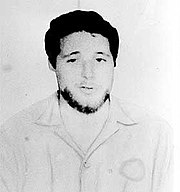
Andrew Goodman was an American civil rights activist. He was one of three Congress of Racial Equality (CORE) workers murdered in Philadelphia, Mississippi, by members of the Ku Klux Klan in 1964. Goodman and two fellow activists, James Chaney and Michael Schwerner, were volunteers for the Freedom Summer campaign that sought to register African-Americans to vote in Mississippi and to set up Freedom Schools for black Southerners.
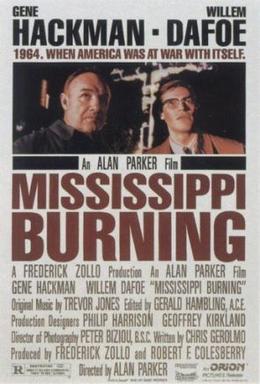
Mississippi Burning is a 1988 American crime thriller film directed by Alan Parker that is loosely based on the 1964 murder investigation of Chaney, Goodman, and Schwerner in Mississippi. It stars Gene Hackman and Willem Dafoe as two FBI agents investigating the disappearance of three civil rights workers in fictional Jessup County, Mississippi, who are met with hostility by the town's residents, local police, and the Ku Klux Klan.
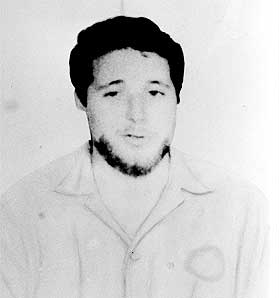
Michael Henry Schwerner was an American civil rights activist. He was one of three Congress of Racial Equality (CORE) field workers killed in rural Neshoba County, Mississippi, by members of the Ku Klux Klan. Schwerner and two co-workers, James Chaney and Andrew Goodman, were killed in response to their civil rights work, which included promoting voting registration among African Americans, most of whom had been disenfranchised in the state since 1890.

Freedom Summer, also known as the Freedom Summer Project or the Mississippi Summer Project, was a volunteer campaign in the United States launched in June 1964 to attempt to register as many African-American voters as possible in Mississippi. Blacks had been restricted from voting since the turn of the century due to barriers to voter registration and other laws. The project also set up dozens of Freedom Schools, Freedom Houses, and community centers such as libraries, in small towns throughout Mississippi to aid the local Black population.

James Earl Chaney was an American civil rights activist. He was one of three Congress of Racial Equality (CORE) civil rights workers killed in Philadelphia, Mississippi, by members of the Ku Klux Klan on June 21, 1964. The others were Andrew Goodman and Michael Schwerner from New York City.

Edgar Ray Killen was an American Ku Klux Klan organizer who planned and directed the murders of James Chaney, Andrew Goodman, and Michael Schwerner, three civil rights activists participating in the Freedom Summer of 1964. He was found guilty in state court of three counts of manslaughter on June 21, 2005, the forty-first anniversary of the crime, and sentenced to 60 years in prison. He appealed the verdict, but the sentence was upheld on April 12, 2007, by the Supreme Court of Mississippi. He died in prison on January 11, 2018, six days before his 93rd birthday.

The murders of Chaney, Goodman, and Schwerner, also known as the Freedom Summer murders, the Mississippi civil rights workers' murders, or the Mississippi Burning murders, were the abductions and murders of three activists in Philadelphia, Mississippi, in June 1964, during the Civil Rights Movement. The victims were James Chaney from Meridian, Mississippi, and Andrew Goodman and Michael Schwerner from New York City. All three were associated with the Council of Federated Organizations (COFO) and its member organization, the Congress of Racial Equality (CORE). They had been working with the Freedom Summer campaign by attempting to register African Americans in Mississippi to vote. Since 1890 and through the turn of the century, Southern states had systematically disenfranchised most black voters by discrimination in voter registration and voting.
United States v. Cecil Price, et al., also known as the Mississippi Burning trial or Mississippi Burning case, was a criminal trial where the United States charged a group of 18 men with conspiring in a Ku Klux Klan plot to murder three young civil rights workers in Philadelphia, Mississippi on June 21, 1964 during Freedom Summer. The trial, conducted in Meridian, Mississippi with U.S. District Court Judge W. Harold Cox presiding, resulted in convictions of 7 of the 18 defendants. Another defendant, James Edward Jordan, pleaded guilty and testified for the prosecution.

Lawrence Andrew Rainey Sr. was an American police officer and white supremacist who served as Sheriff of Neshoba County, Mississippi, from 1963 to 1968. He gained notoriety for his alleged involvement in the June 1964 murders of civil rights activists James Chaney, Andrew Goodman, and Michael Schwerner. He was accused of aiding and abetting members of the Ku Klux Klan in the murders by having his officers keep watch over the men's position in town. Rainey was a member of Mississippi's White Knights of the Ku Klux Klan and had previously gone to court for the shooting of an unarmed black motorist in 1959.
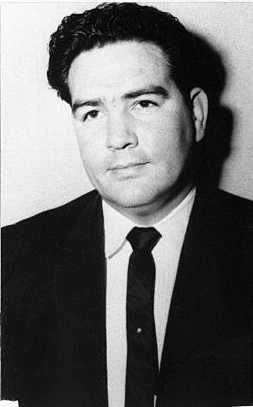
Alton Wayne Roberts was an American murderer and white supremacist. Roberts, a member of the White Knights of the Ku Klux Klan, was convicted for his role in the 1964 Freedom Summer murders. He was the one who fatally shot two of the victims, Congress of Racial Equality civil rights activists Michael Schwerner and Andrew Goodman. Roberts also shot the third activist, James Chaney, but it is debated by some that it was another accomplice, James Jordan, who had killed him. Jordan had identified Roberts as Chaney's killer. In 1967, he was charged and convicted of depriving the slain activists of their civil rights.

Cecil Ray Price was an American police officer and white supremacist. He was a participant in the murders of Chaney, Goodman, and Schwerner in 1964. At the time of the murders, Price was 26 years old and a deputy sheriff in Neshoba County, Mississippi. He was a member of the White Knights of the Ku Klux Klan.

Murder in Mississippi is a 1990 television film which dramatized the last weeks of civil rights activists Michael "Mickey" Schwerner, Andrew Goodman and James Chaney, and the events leading up to their disappearance and subsequent murder during Freedom Summer in 1964. It starred Tom Hulce as Schwerner, Jennifer Grey as his wife Rita, Blair Underwood as Chaney, and Josh Charles as Goodman. Hulce received a nomination for Best Actor in a TV Miniseries at the 1990 Golden Globes.
Samuel Holloway Bowers Jr. was an American white supremacist who co-founded the White Knights of the Ku Klux Klan and became its first Imperial Wizard. Previously, he was a Grand Dragon of the Mississippi Original Knights of the Ku Klux Klan, appointed to his position by Imperial Wizard Roy Davis. Bowers was responsible for instigating and planning the 1964 murders of James Chaney, Andrew Goodman, and Michael Schwerner by members of his Klan chapter near Philadelphia, Mississippi, for which he served six years in federal prison; and the 1966 murder of Vernon Dahmer in Hattiesburg, for which he was sentenced to life in prison, 32 years after the crime. He also was accused of being involved in the 1967–1968 bombings of Jewish targets in the cities of Jackson and Meridian. He died in prison at the age of 82.
Florence Mars was an American civil rights activist and author best known for her book Witness in Philadelphia about the murder of three civil rights activists in Mississippi.
Mississippi Cold Case is a 2007 feature documentary produced by David Ridgen of the Canadian Broadcasting Corporation about the Ku Klux Klan murders of two 19-year-old black men, Henry Hezekiah Dee and Charles Eddie Moore, in Southwest Mississippi in May 1964 during the Civil Rights Movement and Freedom Summer. It also explores the 21st-century quest for justice by the brother of Moore. The documentary won numerous awards as a documentary and for its investigative journalism.

The White Knights of the Ku Klux Klan is a Ku Klux Klan organization which is active in the United States. It originated in Mississippi and Louisiana in the early 1960s under the leadership of Samuel Bowers, its first Imperial Wizard. The White Knights of Mississippi were formed in December 1963, when they separated from the Original Knights after the resignation of Imperial Wizard Roy Davis. Roughly 200 members of the Original Knights of Louisiana also joined the White Knights. The White Knights were not interested in holding public demonstrations nor were they interested in letting any information about themselves get out to the masses. Similar to the United Klans of America (UKA), the White Knights of Mississippi were very secretive about their group. Within a year, their membership was up to around six thousand, and they had Klaverns in over half of the counties in Mississippi. By 1967, the number of active members had shrunk to around four hundred.

Fannie Lee Chaney was an American baker turned civil rights activist after her son James Chaney was murdered by the Ku Klux Klan during the 1964 Freedom Summer rides in Mississippi.
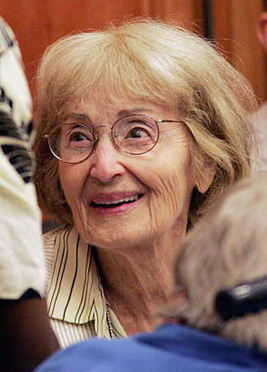
Carolyn Elizabeth Goodman was an American clinical psychologist who became a prominent civil rights advocate after her son, Andrew Goodman and two other civil rights workers, James Chaney and Michael Schwerner, were murdered by the Ku Klux Klan in Neshoba County, Mississippi, in 1964.

Olen Lavelle Burrage was a Mississippi farmer and businessman. He was alleged to have been linked to the murders of Chaney, Goodman, and Schwerner who were murdered by the Ku Klux Klan in June 1964. The bodies of the Civil Rights workers were found buried in an earthen dam that was under construction on a farm owned by Burrage.
"Here's to the State of Mississippi" is a civil rights protest song by Phil Ochs, an American topical singer and songwriter in the 1960s. Ochs is best known for his anti-war and freedom songs. "Here's to the State of Mississippi" was released in 1965 as the last track on his album I Ain't Marching Anymore. The song criticizes the state of Mississippi for its oppression of African Americans. It describes how Jim Crow laws and white supremacy in the South maintained the inequality of African Americans in states such as Mississippi. "Here's to the State of Mississippi" touches on segregation, corrupt and biased school systems, the frequent murders of African Americans and civil rights activists and the crookedness of government officials who ignored or collaborated in the murders.
